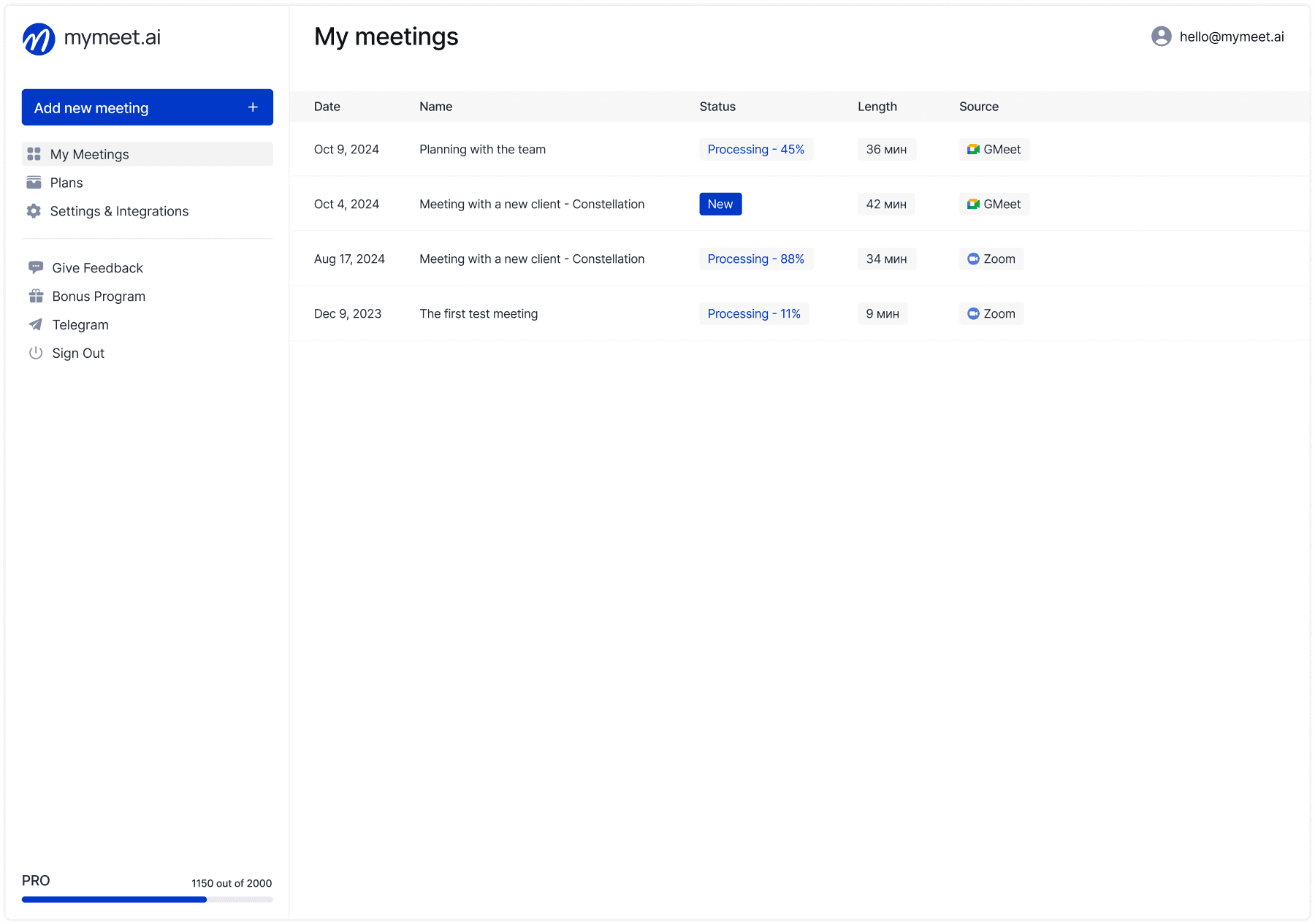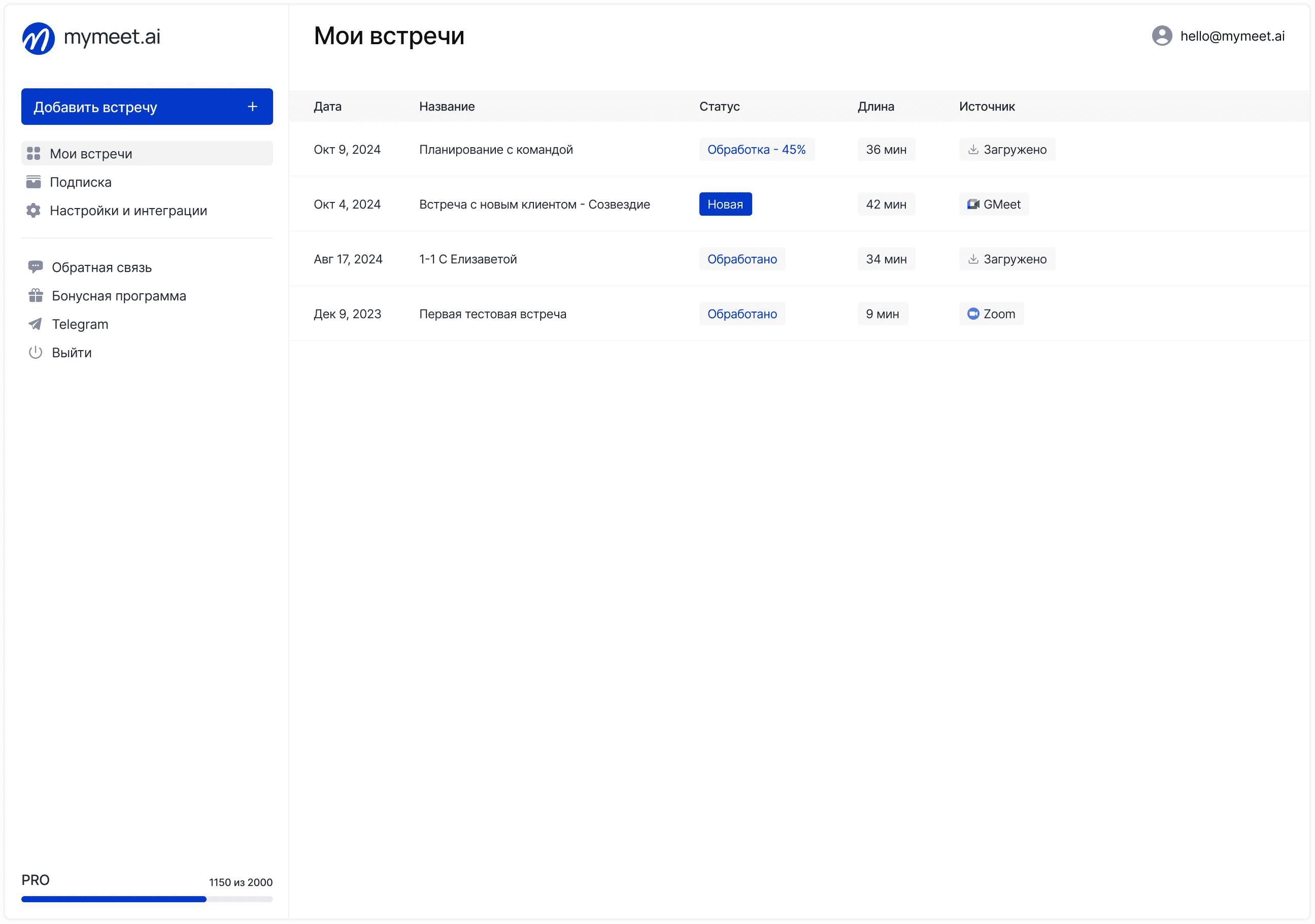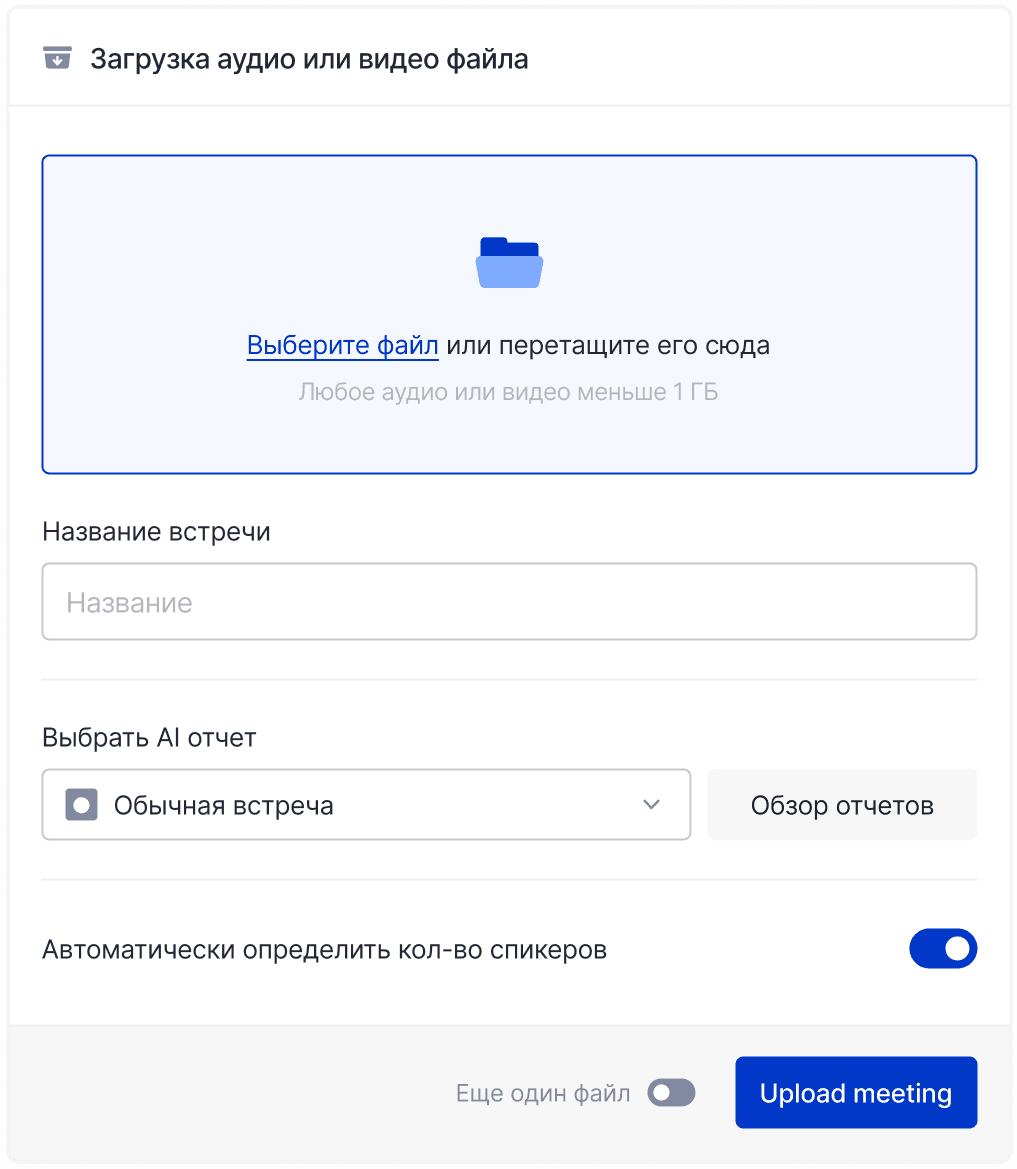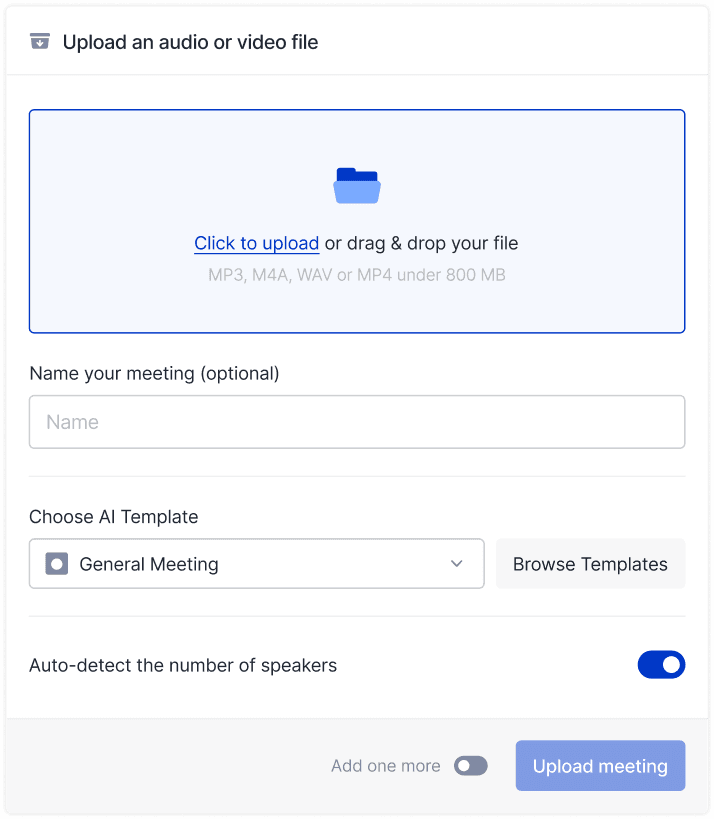Technology & AI

Radzivon Alkhovik
Jul 18, 2025
The manager of a fast-growing IT startup faced a problem: the team spent up to 40% of working time on routine tasks instead of product development. Document management, meeting planning, reporting, and communications consumed resources. After market analysis and testing various solutions, the company implemented a complex of 5 automation tools. Result: saving 25 hours per week for a team of 15 people and 60% productivity growth.
The mymeet.ai team analyzed the global market of automation tools and compiled a ranking of the most effective business solutions. The right choice of automation tools can drastically change company work efficiency and create a foundation for scaling.
Modern business has a wide choice of automation tools — from highly specialized solutions to comprehensive platforms. The key to success lies in choosing tools that solve real company problems and easily integrate into existing processes.
Automation Tool Selection Criteria
When choosing automation tools, it's important to evaluate not only functionality but also practical aspects of implementation and use in business realities.
Functionality and Capabilities
An effective tool should solve specific business tasks and integrate with existing systems. Integration quality determines how smoothly the solution fits into the current company IT ecosystem.
Implementation and Usage Simplicity
Implementation complexity directly affects automation project success. Interface intuitiveness determines how quickly the team masters the new tool.
Scalability and Development
The tool should match business development plans. A solution for a 10-person team might prove ineffective when growing to 100 employees.
Technical Support and Documentation
Technical support quality is critically important during implementation. Quick problem resolution and competent consultations accelerate adaptation to new tools.
Total Cost of Ownership
Consider not only license costs but also implementation expenses, staff training, technical support, and system development.
Security and Reliability
The tool should ensure data protection, regular backups, and high system availability.
Compliance with Regulations
Compliance with data protection regulations is mandatory for tools processing personal data. Data localization becomes an important selection factor.
Reviews and Vendor Reputation
Study other companies' experience, user reviews, and developer reputation. This helps avoid problems during system operation.
Top 10 Best Business Automation Tools
When compiling the ranking, we considered functionality, implementation simplicity, technical support quality, and compliance with global business needs. Each solution was tested on real tasks and evaluated by efficiency and ROI criteria.
1st Place: mymeet.ai — Leader in Business Meeting Automation

Mymeet.ai is a platform for automatic transcription and analysis of business meetings, created for global business needs. The system integrates with popular video conferencing platforms and offers AI analysis of corporate communications.

In testing, mymeet.ai showed the best speech recognition quality among all platforms. The system doesn't just transcribe but analyzes meeting content, automatically highlighting key decisions, tasks, and responsible parties. Integration with leading platforms and enterprise-grade security compliance are major advantages for global companies.
Key Features:
Support for 73 languages with high-quality speech recognition

AI meeting analysis with task, decision, and insight extraction

Integration with leading CRM systems and video conferencing platforms
Telegram bot for quick audio recording processing
Export to popular formats: DOCX, PDF, JSON, Markdown
API for integration with corporate systems
Full compliance with enterprise security standards
Mymeet.ai is the optimal choice for global companies needing quality meeting automation solutions with understanding of business culture specifics. The platform demonstrates the best price-quality ratio in its segment.
2nd Place: Salesforce — Comprehensive CRM and Business Automation

Salesforce represents a universal platform for automating various business aspects: CRM, marketing, service, and analytics. The solution suits companies from 5 to 5000+ employees and offers extensive customization capabilities.
The main advantage of Salesforce is the ability to get multiple tools within one platform with powerful AI capabilities through Einstein AI. This simplifies integration and reduces total cost of ownership. Global presence and extensive partner ecosystem make the solution attractive for international markets.
Key Features:
Advanced CRM with sales and marketing automation
Einstein AI for predictive analytics and automation
Extensive customization and development platform
Marketing Cloud for complex campaigns
Service Cloud for customer support
AppExchange marketplace with thousands of apps
Salesforce suits companies wanting to centralize most business processes in one system with advanced AI capabilities and extensive customization options.
3rd Place: HubSpot — Integrated Marketing, Sales, and Service Platform

HubSpot focuses on automating marketing, sales, and customer service processes. The system offers advanced capabilities for managing the entire customer lifecycle from first contact to long-term relationships.
The platform stands out for high-quality marketing automation, including email campaigns, lead management, content management, and multi-channel analytics. Free tier availability makes it accessible for small businesses, while enterprise features support large organizations.
Key Features:
Comprehensive inbound marketing tools
Advanced sales pipeline management
Customer service and support automation
Content management system and SEO tools
Social media management and monitoring
Detailed analytics and ROI tracking
HubSpot is ideal for companies with active marketing and sales activities. The system pays off quickly through sales funnel automation and lead conversion growth.
4th Place: Microsoft 365 — Productivity and Collaboration Suite

Microsoft 365 provides comprehensive tools for productivity, collaboration, and business process automation. The solution includes familiar applications enhanced with cloud capabilities and AI features.
The system ensures seamless integration between different productivity tools and offers powerful automation through Power Platform. Enterprise security and compliance features make it suitable for organizations with strict requirements.
Key Features:
Complete office suite with cloud collaboration
Power Automate for workflow automation
Teams for communication and collaboration
SharePoint for document management
Power BI for business intelligence
Advanced security and compliance tools
Microsoft 365 suits organizations needing comprehensive productivity tools with automation capabilities and strong security features.
5th Place: Zapier — Integration and Workflow Automation

Zapier specializes in creating automatic integrations between different services and systems without programming. The platform allows setting up complex automation scenarios through a simple interface.
The solution is especially useful for companies using multiple different services and needing their synchronization. Automation of data transfer between systems saves time and reduces errors.
Key Features:
Visual integration constructor
Connection to 5000+ popular services
Automated data transfer between systems
Conditional logic and complex scenarios
Integration monitoring and debugging
Ready-made solution templates
Zapier is a powerful tool for teams using multiple different services. Integration automation can save dozens of working hours monthly.
6th Place: Asana — Project Management and Team Collaboration

Asana combines project management, task tracking, and team collaboration in a unified platform. The system offers flexible customization capabilities for different types of business specifics.
Asana's strong point is the ability to create custom workflows and automate complex work scenarios. The platform suits service companies, agencies, and project organizations with diverse processes.
Key Features:
Flexible project and task management
Customizable workflows and automation
Team collaboration and communication tools
Time tracking and resource management
Portfolio management and reporting
Integration with popular business tools
Asana works best for service companies and agencies with complex project workflows. Customization flexibility allows adapting the system to any business specifics.
7th Place: Slack — Communication and Workflow Automation

Slack specializes in team communication automation and workflow integration. The system offers simple tools for creating automatic processes without programming.
The platform is especially effective for companies with extensive team communications and integrations. Intuitive interface allows quick setup of even complex automation processes.
Key Features:
Team messaging and communication
Workflow automation with Workflow Builder
Extensive app marketplace
File sharing and collaboration
Video calls and screen sharing
Advanced search and organization
Slack is an ideal choice for teams with intensive communication needs and workflow automation requirements.
8th Place: Monday.com — Work Management Platform

Monday.com offers a comprehensive work management platform combining project management, CRM, and team collaboration. The system provides visual project tracking and customizable workflows.
The main advantage is deep customization capabilities and visual project representation. This makes the solution attractive for creative teams and project-based organizations.
Key Features:
Visual project management boards
Customizable workflows and automations
Time tracking and resource planning
Team collaboration tools
Integration marketplace
Mobile apps for remote work
Monday.com suits teams preferring visual project management with extensive customization options.
9th Place: Notion — All-in-One Workspace

Notion provides a unified workspace combining notes, databases, project management, and team collaboration. The system offers unprecedented flexibility in organizing information and workflows.
The solution is especially valuable for teams needing flexible information organization and knowledge management. Modular approach allows creating custom solutions for any business needs.
Key Features:
Flexible note-taking and documentation
Database and project management
Team collaboration and sharing
Template marketplace
Integration capabilities
Offline access and sync
Notion is ideal for teams needing flexible workspace organization and comprehensive knowledge management.
10th Place: Airtable — Database and Project Management Hybrid

Airtable combines spreadsheet simplicity with database power, offering unique capabilities for data management and project organization. The platform allows creating custom applications without programming.
The solution is especially useful for teams working with structured data and needing flexible reporting. Visual interface makes complex data management accessible to non-technical users.
Key Features:
Spreadsheet-database hybrid interface
Custom app building capabilities
Advanced filtering and sorting
Collaboration and sharing tools
Integration marketplace
Mobile apps and offline sync
Airtable works well for teams needing flexible data management with project collaboration capabilities.
Comparison Table of Best Automation Tools
Tool selection often depends on the balance between functionality, implementation complexity, and company budget. The comparison table helps quickly evaluate key parameters of each solution and narrow the candidate list for detailed study.
Tool | Application Area | Implementation Complexity | Key Features | Best For |
mymeet.ai | Meeting automation | Low | AI analysis, multi-language | All companies |
Salesforce | Comprehensive CRM | High | Einstein AI, extensive platform | Enterprise |
HubSpot | Marketing & Sales | Medium | Inbound marketing | Growth companies |
Microsoft 365 | Productivity suite | Low | Complete office suite | All organizations |
Zapier | Integrations | Medium | 5000+ integrations | Multi-tool teams |
Asana | Project management | Medium | Flexible workflows | Project teams |
Slack | Team communication | Low | Communication hub | Remote teams |
Monday.com | Work management | Medium | Visual boards | Creative teams |
Notion | All-in-one workspace | Medium | Flexible workspace | Knowledge teams |
Airtable | Database management | Medium | Spreadsheet-database | Data teams |
Note the relationship between cost and implementation complexity — often more expensive solutions require greater time investments for setup and team training. For quick start, choose tools with low implementation complexity, even if their functionality is limited.
How to Choose the Right Automation Tool
Automation tool selection should be based on analysis of specific business needs, not solution popularity or functionality.
Start by defining problems that need solving through automation. Create a list of processes requiring optimization and evaluate potential effects from their automation.
Consider not only current needs but also business development plans. The tool should scale with the company and support growing data volumes and users.
Always test solutions before purchasing. Most modern tools offer free trial periods or demo versions for functionality evaluation.
Conclusion
The right choice of automation tools can drastically change company work efficiency and create a foundation for sustainable growth. Best solutions combine powerful functionality with ease of use and regulatory compliance.
Start automation by solving the most critical problems and gradually expand technology application. A comprehensive approach using several specialized tools often proves more effective than attempts to find one universal solution.
Start optimizing business communications today: try mymeet.ai for meeting analysis automation and protocol creation. 180 minutes of free testing will show how artificial intelligence can free your team from routine documentation tasks.
FAQ about Automation Tool Selection
Which automation tools to choose for small business?
For small businesses, it's recommended to start with simple and affordable solutions: CRM for customer management, email automation for marketing, cloud document storage. Avoid complex ERP systems in early stages.
How much do business automation tools cost?
Cost varies from free solutions to tens of thousands of dollars monthly. Simple tools usually cost $10-50 per user monthly, comprehensive solutions — from $100+ per workplace.
How to evaluate automation tool effectiveness?
Measure employee time savings, error reduction, process acceleration, and project ROI. Record baseline metrics before implementation and track changes.
Should you use only domestic automation tools?
Not necessarily, but it's important to consider data protection requirements and possible foreign software restrictions. Local solutions are often better adapted to regional specifics and requirements.
How to integrate different automation tools?
Choose tools with ready integrations or open APIs. Use aggregator platforms to connect different services. Plan integrations at the tool selection stage.
What mistakes are most common when choosing automation tools?
Main mistakes: choosing overly complex solutions, ignoring user needs, lack of testing, underestimating staff training importance, choosing tools without clear goal understanding.
Can all business processes be automated?
Not all processes suit automation. Creative tasks, complex negotiations, and strategic planning are better left to humans. Automate routine, repetitive operations.
How to prepare a team for new automation tool implementation?
Explain change goals and benefits, involve employees in solution selection, ensure quality training, appoint project managers, provide technical support during implementation.
What's more important: functionality or tool simplicity?
Balance depends on company specifics. For small businesses, simplicity is often more important than functionality. For large companies with complex processes, powerful functionality may justify additional complexity.
How often should you review automation tool choices?
Conduct tool audits annually or during significant business changes. Technologies develop rapidly, and new solutions may prove more effective than existing ones.
Radzivon Alkhovik
Jul 18, 2025








